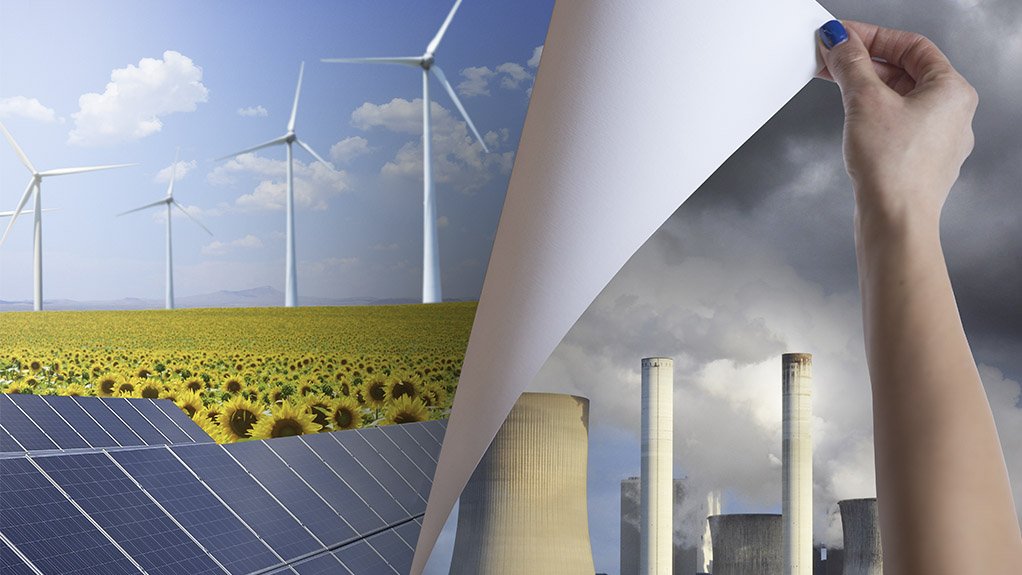Policy gaps, rigid legislation highlighted as key hurdles in just energy transition
Policy gaps and rigid legislation continue to hold back South Africa’s energy transition, according to a new report supported by diversified miner Anglo American and compiled by research organisation Economist Impact titled ‘Powering Progress: Policy shifts and economic frameworks to enable South Africa’s energy transition’.
The report noted that the 2019 Integrated Resource Plan (IRP) remained the key framework governing the energy landscape. However, the consensus among policy experts is that the strategy is incomplete and outdated.
The Renewable Energy Independent Power Producer Procurement Programme (REIPPPP), designed to attract private-sector investment and expertise into grid-connected renewables, also needs to be transformed, the report states.
The report suggests that better bidding practices and more favourable terms for participation can enhance the programme. In addition, revising the programme to focus on transmission instead of generation could add greater value to the grid.
The report notes that agile policies and robust technical expertise must inform regulatory interventions to support the energy transition.
Another key finding in the report is that, without suitable supporting policies, the unbundling of South Africa’s energy sector is unlikely to progress at the necessary pace.
The report notes how efforts to unbundle Eskom into three subsidiaries for generation, transmission and distribution are following a State-issued plan aimed at energy diversification, revenue maximisation and debt reduction.
More broadly, however, the privatisation of the utilities sector remains a contentious subject for change-resistant politicians and unions. However, there is still plenty of evidence to suggest renewable power will offer inexpensive and reliable electricity for low-income households.
Engaging in international partnerships is another recommendation made in the report, as it can drive accountability, implementation and funding to support a just energy transition.
The most prominent of these types of partnerships is the Just Energy Transition Partnership (JETP), formed between the governments of South Africa, France, Germany, the UK, the US and the European Union.
It includes $8.5-billion of concessional loans and investment guarantees to enable favourable borrowing terms and project derisking. However, experts say that little has materialised from the JETP as the South African government has been slow to develop the investment and implementation plans.
The Powering Progress report also states that certain paradoxes in the government’s energy-related fiscal programmes must be addressed to create a sustainable and diversified energy mix.
For example, while subsidies to support renewables exist, the South African government also supports fossil fuels through tax exemptions for the use of oil, coal and gas.
In addition, the Climate Action Tracker has found that the current carbon tax is too low to motivate companies to reduce emissions. The government must take bold and coordinated steps to dismantle regulations that run counter to the principles of a just and sustainable energy transition.
To deliver a just transition, Economist Impact says creative and timely social policies must be deployed, with a focus on the youth.
In the transition away from coal, more than 90 000 jobs are estimated to be lost, which is causing resistance from unions. However, the think tank Brookings Institution shows that the JETP would create as many as one-million jobs between 2023 and 2050, which is more than three times the number of jobs that will be lost in the transition.
However, to facilitate the transition of people from coal to renewable-energy jobs requires various forms of transition assistance, from temporary basic income to training programmes for reskilling.
“The jobs, opportunities and business that flow from using clean power is only one side of the equation. In addition to the jobs, opportunities and commerce that would be expected from having affordable access to clean power, there can be little doubt that increased grid capacity and grid stability would also help attract new investment into South Africa – all the while furthering our collective decarbonisation ambitions,” Anglo American South Africa chairperson Nolitha Fakude says.
Comments
Press Office
Announcements
What's On
Subscribe to improve your user experience...
Option 1 (equivalent of R125 a month):
Receive a weekly copy of Creamer Media's Engineering News & Mining Weekly magazine
(print copy for those in South Africa and e-magazine for those outside of South Africa)
Receive daily email newsletters
Access to full search results
Access archive of magazine back copies
Access to Projects in Progress
Access to ONE Research Report of your choice in PDF format
Option 2 (equivalent of R375 a month):
All benefits from Option 1
PLUS
Access to Creamer Media's Research Channel Africa for ALL Research Reports, in PDF format, on various industrial and mining sectors
including Electricity; Water; Energy Transition; Hydrogen; Roads, Rail and Ports; Coal; Gold; Platinum; Battery Metals; etc.
Already a subscriber?
Forgotten your password?
Receive weekly copy of Creamer Media's Engineering News & Mining Weekly magazine (print copy for those in South Africa and e-magazine for those outside of South Africa)
➕
Recieve daily email newsletters
➕
Access to full search results
➕
Access archive of magazine back copies
➕
Access to Projects in Progress
➕
Access to ONE Research Report of your choice in PDF format
RESEARCH CHANNEL AFRICA
R4500 (equivalent of R375 a month)
SUBSCRIBEAll benefits from Option 1
➕
Access to Creamer Media's Research Channel Africa for ALL Research Reports on various industrial and mining sectors, in PDF format, including on:
Electricity
➕
Water
➕
Energy Transition
➕
Hydrogen
➕
Roads, Rail and Ports
➕
Coal
➕
Gold
➕
Platinum
➕
Battery Metals
➕
etc.
Receive all benefits from Option 1 or Option 2 delivered to numerous people at your company
➕
Multiple User names and Passwords for simultaneous log-ins
➕
Intranet integration access to all in your organisation



















